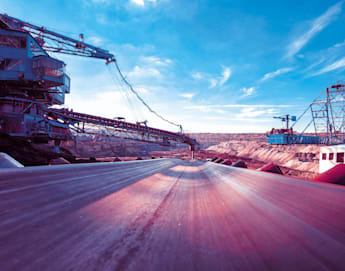Locations
The sector's skills and knowledge gaps are widening at a time when critical minerals security relies on new geologists, mining engineers and metallurgists coming into the industry.
A global survey by consulting firm McKinsey published in February 2023 found 70% of its 15- to 30-year-old respondents "definitely wouldn’t" or "probably wouldn’t" consider working in the mining industry.
This finding ranked the mining sector as the least popular career choice for all the professions McKinsey surveyed – behind oil and gas.
Over the past two decades, undergraduate mining numbers have tended to lag the commodities cycle by around two years.
In the last cycle, however (which lasted roughly from 2001 to around 2014), data presented by the Camborne School of Mines (CSM) at the UK Mining Conference in September this year showed enrolment of mining students decoupled from the industry's financial performance, with numbers dropping off in the UK, US and Australia.
In the UK, no undergraduate mining engineering courses are currently offered by UK higher education institutions, after the CSM paused the last remaining undergraduate programme dedicated to mining engineering in 2020.
This has created a cliff-edge of expertise, which threatens to leave mining companies short of personnel to staff new projects and risks the loss of decades of knowledge, as the sector's ageing workforce begins to retire.
Why does mining have an image problem?
The working assumption by the mining industry is that the values of today's school leavers and students today do not chime with their perceptions of what mining careers offer.
Mining is seen as dirty, dangerous and old fashioned, at a time when clean, safe and innovative are buzzwords for recruitment.
The industry also has a reputation for low levels of diversity and consequently a non-inclusive culture.
While the mining industry has made significant strides in recent years to address historic sustainability and diversity issues, and offers flexible, well-remunerated career opportunities, this message is struggling to penetrate to, and resonate with, young talent.
Why does the skills shortage matter?
There is a general supposition that mining is a declining industry and that dwindling skills reserves are largely the result inevitable natural wastage.
However, the personnel shortage is made more acute by mining's robust fundamentals and the modernising influence of new sector regulations.
These include surging demand for critical minerals; a need for new, low impact mining methods; demand for ESG expertise; and the requirement for a much wider range of core competencies, including software and data analytics skills.
Critical minerals security within the UK and the EU partly depends on a robust talent pipeline of geologists, mining engineers and metallurgists, so it is incumbent on the mining industry to fix its recruitment problem.
How can the mining industry unblock its talent pipeline?
- Create an inclusive culture
There are several steps organisations in the mining industry can take to create an inclusive culture.
For example, they can:
- Implement inclusive recruitment practices that involve diverse interview panels and extend to underrepresented groups.
- Ensure the company's leadership is fully committed to diversity and inclusion initiatives and are championing inclusive practices.
- Implement clear, robust and easily accessible policy frameworks that set out conduct expectations in the workplace and promote confidential reporting channels for voicing concerns.
- Deploy mandatory training for employees on bullying and harassment in the workplace that allows staff to recognise and feel empowered to report behaviour they are uncomfortable with.
- Think about how you can enhance your statutory obligations to your staff
Since the Covid-19 pandemic, working age people have placed an even greater premium on work-life balance.
It can be particularly challenging to accommodate this in the mining industry, where roles may require demanding shifts and working away from home.
To attract and retain top talent, mining sector employers should consider going beyond the statutory obligations by offering flexible working arrangements or more generous parental leave arrangements wherever possible.
This sends a clear message to prospective employees that they are committed to nurturing a diverse workforce with different needs and preferences, rather than just individuals without caring responsibilities or other commitments.
- Review your gender and ethnicity pay gaps and think about how to close them, if these exist
While mining industry professionals are generally well-remunerated, employers should not mistake high rates of overall pay for reason not to monitor gender and ethnicity pay levels.
Prospective employees increasingly expect transparency around pay and for any wage disparities to be rectified.
Mining industry employers should analyse their data to ensure those in different recognised groups (gender, ethnicity and disability) are paid equally, and where gaps exist, understand the factors contributing to pay disparity and devise action plans to remedy inequalities.
- Consider overseas recruitment by investigating visa routes
Mining companies may be faced with a shortage of qualified candidates locally – particularly in the UK, where the provision of relevant training has dwindled due to lack of demand.
It may be necessary to consider overseas recruitment, by exploring available visa routes.
While choosing the right scheme and navigating the visa application process can be expensive and complicated and generally requires specialist immigration advice, hiring overseas talents allows organisations to tap into a wealth of international expertise which will contribute to a more dynamic, culturally diverse workplace.
This will not only bolster the workforce but will also position mining industry employers for success in an increasingly globalised business environment.
This article was authored by Melanie Talbot and Oliver Abel Smith, Partners and Co-Heads of Mining at Fieldfisher, and Alex Kalu, Employment Solicitor, at Fieldfisher.
